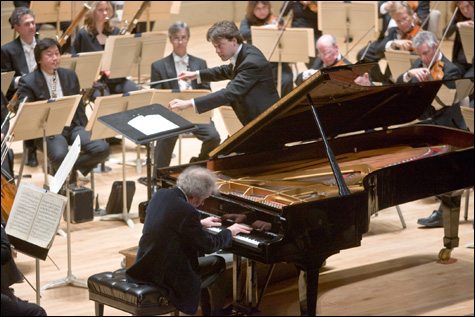
LIKE FATHER, LIKE SON: Their impromptu Emperor was a season highlight — will the BSO bring
Anton and Julian Kuerti back? |
Moved and excited by pianist Leon Fleisher in Beethoven’s Emperor Concerto with the Boston Symphony, I wanted to hear it again. But at 6 pm a week ago Tuesday, Fleisher, with a bad stomach flu, cancelled, and the Austrian/Canadian pianist Anton Kuerti — in town to hear the debut of one of the BSO’s two new assistant conductors, his son Julian — agreed to go on, without rehearsal. I was disappointed — but not for long.
This also became the BSO debut of the 69-year-old Kuerti, a masterful and elegant player who studied with Rudolf Serkin and Mieczyslaw Horszowski and at the Longy School, and who played the first movement of the Grieg Piano Concerto at a children’s concert with the Esplanade Orchestra under Arthur Fiedler a week before his tenth birthday. Fleisher, at 79 still troubled by focal dystonia in his right hand, had to slow down the fast movements and still missed a few notes. (He played “beyond the notes.”) But Kuerti, playing from memory, hit them all, jawdroppingly full speed ahead. His sound is softer-edged than Fleisher’s jewel-like pointedness, but also crystalline, transparent, and so precise that every note is distinguishable, even flying by at hummingbird speed. The Emperor is full of trills, and Kuerti’s are virtually birdlike, rising over gravity before floating downward.
Kuerti doesn’t have Fleisher’s muscularity or heroic sense of drama, but he shares Fleisher’s extraordinary musical continuity. He seemed to play each movement, especially the slow, songful middle movement, in a single breath. His pacing was flawless, especially in Beethoven’s unbroken transition from the inward slow movement to the extroverted, dancing finale, which he plunged into with breathtaking daring.
This was the second consecutive BSO program during which a major soloist had to cancel. The previous week, baritone Thomas Quasthoff sang a set of Schubert songs and then lost his voice. At the remaining concerts he was replaced with the Brahms Serenade the BSO had played the week before.
Meanwhile, Kuerti’s 31-year-old son, who had provided such sympathetic and imaginative support for Fleisher, delivered the same for his father’s very different approach. Surely the BSO will reschedule this memorable pairing, and with some advance notice.
The following week, no one got sick. Italian conductor and Royal Philharmonic music director Daniele Gatti returned to the BSO with Garrick Ohlsson in the Schumann Piano Concerto and closed with Shostakovich’s Fifth Symphony. Both were strong if slightly ragged performances. The old seating arrangement and oboist Keisuke Wakao’s unyielding solo work in the Schumann didn’t help. Gatti has a way of micromanaging musical events so that everything sounds impressive in passing — a string of sculpted moments — but nothing adds up. Intensity without continuity. The long slow movement of the Shostakovich seemed endless. Ohlsson was in good form, playing with both delicacy and sweeping power, but he seemed somehow abstract — impersonal and generic — rather than catching Schumann’s interior tug of war.